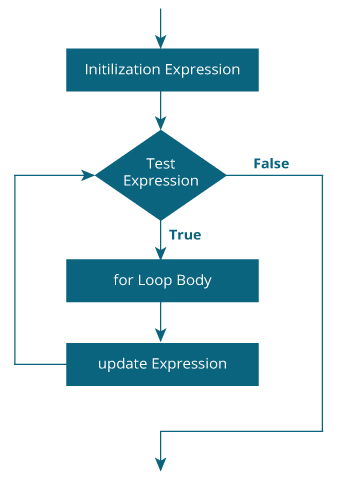In programming, a loop is used to repeat a block of code until the specified condition is met.
C programming has three types of loops:
- for loop
- while loop
- do...while loop
We will learn about for loop in this tutorial. In the next tutorial, we will learn about while and do...while loop.
for Loop
The syntax of the for loop is:
for (initializationStatement; testExpression; updateStatement)
{
// statements inside the body of loop
}
How for loop works?
- The initialization statement is executed only once.
- Then, the test expression is evaluated. If the test expression is evaluated to false, the
forloop is terminated. - However, if the test expression is evaluated to true, statements inside the body of the
forloop are executed, and the update expression is updated. - Again the test expression is evaluated.
This process goes on until the test expression is false. When the test expression is false, the loop terminates.
To learn more about test expression (when the test expression is evaluated to true and false), check out relational and logical operators.
for loop Flowchart

Example 1: for loop
// Print numbers from 1 to 10
#include <stdio.h>
int main() {
int i;
for (i = 1; i < 11; ++i)
{
printf("%d ", i);
}
return 0;
}
Output
1 2 3 4 5 6 7 8 9 10
- i is initialized to 1.
- The test expression
i < 11is evaluated. Since 1 less than 11 is true, the body offorloop is executed. This will print the 1 (value of i) on the screen. - The update statement
++iis executed. Now, the value of i will be 2. Again, the test expression is evaluated to true, and the body offorloop is executed. This will print 2 (value of i) on the screen. - Again, the update statement
++iis executed and the test expressioni < 11is evaluated. This process goes on until i becomes 11. - When i becomes 11, i < 11 will be false, and the
forloop terminates.
Example 2: for loop
// Program to calculate the sum of first n natural numbers
// Positive integers 1,2,3...n are known as natural numbers
#include <stdio.h>
int main()
{
int num, count, sum = 0;
printf("Enter a positive integer: ");
scanf("%d", &num);
// for loop terminates when num is less than count
for(count = 1; count <= num; ++count)
{
sum += count;
}
printf("Sum = %d", sum);
return 0;
}
Output
Enter a positive integer: 10 Sum = 55
The value entered by the user is stored in the variable num. Suppose, the user entered 10.
The count is initialized to 1 and the test expression is evaluated. Since the test expression count<=num (1 less than or equal to 10) is true, the body of for loop is executed and the value of sum will equal to 1.
Then, the update statement ++count is executed and count will equal to 2. Again, the test expression is evaluated. Since 2 is also less than 10, the test expression is evaluated to true and the body of the for loop is executed. Now, sum will equal 3.
This process goes on and the sum is calculated until the count reaches 11.
When the count is 11, the test expression is evaluated to 0 (false), and the loop terminates.
Then, the value of sum is printed on the screen.
We will learn about while loop and do...while loop in the next tutorial.

